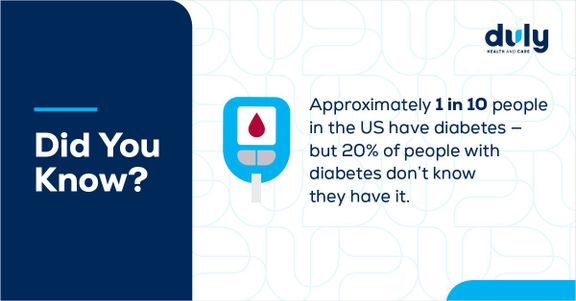In the US, over 37 million people have diabetes, and over 96 million people have prediabetes. Despite being a relatively common condition, a lot of information about diabetes simply isn’t true.
Unlearning misconceptions about diabetes is a key part of ending the stigma surrounding it — and helping more people get the support and treatment they need.
Here are 5 myths about diabetes — and the actual truths behind them.
MYTH #1: If you have diabetes, you already know you have it.
When you fall and break your arm, it’s pretty obvious that you’ve broken a bone. You know to get it checked out, and you’ll be sure to take care of it while it heals.
Some conditions, like diabetes, aren’t as obvious as a broken bone.

Diabetes is a long-term (chronic) condition that affects your body’s ability to process insulin. Insulin is a hormone that works to keep your blood sugar or blood glucose at a normal level. Without it, your blood sugar can fluctuate between high and low levels and can cause serious damage like heart disease, kidney failure, and vision loss.
Diagnosis for diabetes is a key part of treating your diabetes, yet many people don’t even realize they have diabetes. Because you can have diabetes without even knowing it, it’s critical to stay on top of your annual wellness visits.
As a part of your routine check-up, your provider will order a test of your A1C level or your blood sugar starting around age 45 — or earlier if your diabetes risk is higher. This simple blood test is a great defense against diabetes and prediabetes, giving you and your provider important information about your health.
MYTH #2: If you are “overweight,” then you will get diabetes.
Weight can be a sensitive subject for a lot of people, and you may worry about how your weight impacts your risk of being diagnosed with diabetes. Your chances of having diabetes can be impacted by your weight, but it is not the only factor contributing to your risk.
You can be diagnosed with diabetes at any size, and no specific weight is a guarantee that you will develop diabetes. There’s more to whether you get diabetes than just your weight, and a great way to lower your risk for diabetes is with regular exercise and a healthy diet.
MYTH #3: Diabetes is contagious.
Unlike the common cold or COVID-19, you can’t “catch” diabetes from someone else. Experts aren’t entirely sure why some people get diabetes instead of others, but it’s not something that you can give to someone like the flu.
While diabetes isn’t contagious, it’s possible that genetics and lifestyle factors play some kind of role. For instance, type 2 diabetes tends to run in families — but that could be because of genetics or because of similar environmental factors.
Other factors, like polycystic ovary syndrome (PCOS), can also make you more likely to develop type 2 diabetes.
MYTH #4: Once you’ve been diagnosed with diabetes, you can’t ever enjoy sweet treats.
While sweets and desserts do contain simple sugars that can increase your blood glucose levels, that doesn’t mean they are off the table for good. In reality, you can still enjoy a sweet treat — and there are many alternatives you may not even realize.
Your Duly Health and Care team can work with you to better understand your diabetes and specific needs. They can help you focus on nutrition and provide helpful tips and tricks specific to your diabetes management.
Remember: You should always follow your healthcare provider’s recommendations about sugar intake and insulin usage — and your Duly team can help you determine what’s best for you. Schedule an appointment with a Duly Diabetes Educator today.
MYTH #5: Being prescribed insulin means you’re not doing a good job managing your diabetes.
Being diagnosed with diabetes can be overwhelming, and you may feel like you have to do everything you can to manage it. When you’re prescribed insulin, you may feel like you aren’t doing enough to keep your diabetes under control.
These feelings are normal, but you don’t have to feel guilty. When your provider prescribes insulin, it doesn’t mean you’re not doing enough to manage your condition. Instead, it just means that you and your provider are taking an important step to help you live your healthiest life. Just like you might take medication for high blood pressure or a headache, insulin is a good tool to have in your diabetes plan.
Your Duly Team Can Help You Manage Your Diabetes
Managing your diabetes doesn’t have to be confusing, time-consuming, or anxiety-inducing.
Your Duly care team is here to provide you with the resources, treatment plan, and support you need to feel confident in your health journey with diabetes.
Meet our Diabetes Care & Education team today.
Health Topics:








